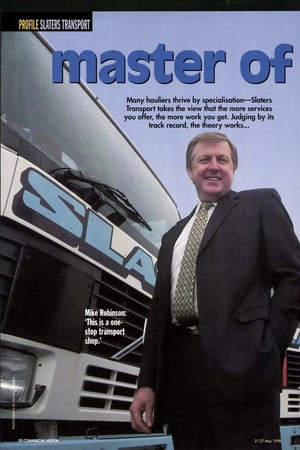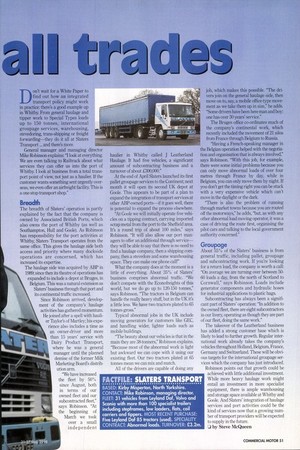• ■■ Many hauliers thrive by specialisation—Slaters Transport takes the
Page 50

Page 51

If you've noticed an error in this article please click here to report it so we can fix it.
view that the more services you offer, the more work you get. Judging by its track record, the theory works...
FACTFILE: SLATERS TRANSPORT BASED: Kirby Misperton, North Yorkshire. CONTACT: Mike Robinson, managing director. FLEET: 31 vehicles from Leyland Daf, Volvo and Scania with more than 100 specialist trailers including stepframes, low loaders, flats, coil carriers and tippers. MOST RECENT PURCHASE: Five Leyland Daf 85 tractors (used). SPECIALITY CONTRACT: Abnormal loads. TURNOVER: £3.2m • -41r)on't wait for a White Paper to find out how an integrated transport policy might work in practice: there's a good example up in Whitby. From general haulage and tipper work to Special Types loads up to 150 tonnes, international groupage services, warehousing, stevedoring, trans-shipping or freight forwarding—they do it all at Slaters Transport ... and there's more.
General manager and managing director Mike Robinson explains: "I look at everything. We are even talking to Railtrack about what services they can offer us into the port of Whitby. I look at business from a total transport point of view, not just as a haulier. If the customer wants something sent urgently overseas, we even offer an airfreight facility This is a one-stop transport shop."
Breadth The breadth of Slaters' operation is partly explained by the fact that the company is owned by Associated British Ports, which also owns the port of Whitby (as well as Southampton, Hull and Goole). As Robinson has responsibility for the port activities at Whitby, Slaters Transport operates from the same office. This gives the haulage side both access and priority where many dockside operations are concerned, which has increased its expertise.
The haulage side was acquired by ABP in 1989; since then its theatre of operations has expanded to include a depot at Bruges, in Belgium. This was a natural extension as Slaters' business through that port and its continental traffic increased.
Since Robinson arrived, development of the company's haulage activities has gathered momentum. He joined after a spell with haulier Taylor's of Martley; his expe rience also includes a time as an owner-driver and more than 15 years' service with Dairy Product Transport, where he was a general manager until the planned demise of the former Milk Marketing Board's distribution arm.
"We have increased the fleet by 50% since August, both in terms of our owned fleet and our subcontracted fleet," says Robinson. "At the beginning of March we took over a small independent haulier in Whitby called J Leatherland Haulage. It had five vehicles, a significant amount of subcontracting business and a turnover of about £300,000."
At the end of April Slaters launched its first pallet groupage services to the Continent next month it will open its second UK depot at Goole. This appears to be part of a plan to expand the integration of transport services at other ABP-owned ports—if it goes well, there is potential to expand the process elsewhere.
"At Goole we will initially operate five vehicles on a tipping contract, carrying imported scrap metal from the port to the Sheffield area. It's a round trip of about 100 miles," says Robinson. "It will also allow our port managers to offer an additional through service they will be able to say that there is no need to find a haulage company, then a shipping company, then a stevedore and some warehousing space. They can make one phone call!"
What the company does at the moment is a little of everything. About 35% of Slaters' business comprises abnormal traffic. "We don't compete with the Econofreights of this world, but we do go up to 120-150 tonnes," says Robinson. "The tractors in Belgium can handle the really heavy stuff, but in the UK it's a little less. We have two tractors plated to 65 tonnes gross."
Typical abnormal jobs in the UK include moving generators for customers like GEC, and handling wider, lighter loads such as mobile buildings.
"The beauty about our vehicles is that in the main they are 38-tonners," Robinson explains. "Because most of the abnormal work is light but awkward we can cope with it using our existing fleet. Our two tractors plated at 65 tonnes mean we can mix and match.
All of the drivers are capable of doing any job, which makes this possible. "The drivers join on the general haulage side, then move on to, say, a mobile office-type movement as we take them up in size," he adds. "Some drivers have been here man and boy: one has over 30 years' service."
The Bruges office co-ordinates much of the company's continental work, which recently included the movement of 21 silos from France through Belgium to Russia.
"Having a French-speaking manager in the Belgian operation helped with the negotiation and organisation that is always involved," says Robinson. "With this job, for example, there were some initial problems because you can only move abnormal loads of over four metres through France by day, while in Belgium, you can only move them by night If you don't get the timing right you can be stuck with a very expensive vehicle which can't move in the daylight or the dark.
"There is also the problem of running through market towns because you are routed off the motorways," he adds, "but, as with any other abnormal load moving operator, it was a case of driving the route first, organising the pilot cars and talking to the local government authority concerned."
Groupage About 55% of the Slaters' business is from general traffic, including pallet, groupage and subcontracting work. If you're looking for a return load, the company is worth a call: "On average we are turning over between 5060 loads a day, from the north of Scotland to Cornwall," says Robinson. Loads include generator components and hydraulic hoses for industrial applications to plastic bags.
Subcontracting has always been a significant part of Slaters' operation: "In addition to the owned fleet, there are eight subcontractors in our livery operating as though they are part of our fleet, doing the same work."
The takeover of the Leatherland business has added a strong customer base which is likely to lead to further growth. Regular international work already takes the company's vehicles throughout Holland, Belgium, France, Germany and Switzerland. These will be obvious targets for the international groupage services which the company has just introduced.
Robinson points out that growth could be achieved with little additional investment. While more heavy haulage work might entail an investment in more specialist equipment, there is ample warehousing and storage space available at Whitby and Goole. And Slaters' integration of haulage services and port activities could be the kind of services now that a growing number of transport providers will be expected to supply in the future.
CI by Steve McQueen






















































































































